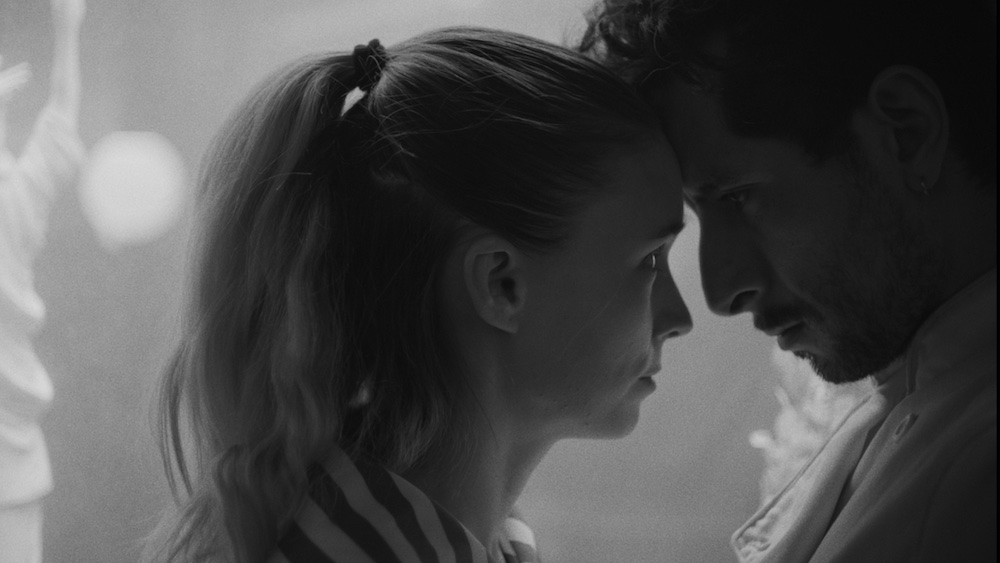
Before demonstrating himself to be one of Mexico’s most original and exciting new filmmaking talents, Alonso Ruizpalacios washed dishes in a bustling big-city kitchen. That experience informs every second of the “Museo” director’s fourth feature, “La Cocina,” a thrilling in-spirit adaptation of Arnold Wesker’s 1957 play “The Kitchen,” transposed from midcentury London to modern-day New York.
A chaotic symphony of nearly two dozen characters, this black-and-white indie confection (garnished with sparing touches of color) mixes biting social critique with stylistic bravura. The setting is in the guts of a high-volume midtown Manhattan restaurant called The Grill — a hectic pressure cooker where personal and professional concerns come to a boil.
The food looks edible at best, and a lot less enticing after we’ve witnessed the commotion that goes into preparing it. In Ruizpalacios’ version, practically the entire staff — not Rooney Mara’s pregnant waitress, but the ones touching the food, at least — are immigrants caught between the proverbial frying pan (sweating into their orders amid the midday rush) and the fire (of losing their work status, which exposes them to the risk of deportation).
Wesker would have approved of Ruizpalacios’ changes. As the left-leaning playwright explained at the time: “The world might have been a stage for Shakespeare but to me it is a kitchen, where people come and go and cannot stay long enough to understand each other, and friendships, loves and enmities are forgotten as quickly as they are made.”
The Mexican writer-director shares Wesker’s solidarity-minded admiration for the soldiers of food service, taking an immersive approach to their work. “La Cocina” thrusts us into the trenches, while updating the issues that threaten to derail another chaotic day in the operation — from the waitress weighing whether to abort to an investigation into roughly $800 missing from the till (almost exactly the cost of the procedure).
Ruizpalacios actually opens the film far from 49th Street, where rats eat the leftovers of yesterday’s slop. There’s a dreamy, slightly amateurish quality to the slow-motion prologue, which follows Estela (Anna Diaz), a young Mexican immigrant with experience in a Michelin-starred restaurant, as she makes the pilgrimage to this glamorously located but otherwise unremarkable establishment to interview for a job.
It’s a logical way in — not unlike the “Mad Men” pilot, which followed inexperienced Peggy into a daunting workplace environment, letting audiences learn the ropes alongside the new girl. Here, Estela serves as our guide, then moves to the background. She knows to drop the name of family friend Pedro (Raúl Briones), who preps poultry dishes all day at The Grill. That strategy gets her the job, even if Pedro himself is on thin ice, three strikes away from being fired.
He shows up late for work and quickly becomes the primary suspect in the register robbery — an invention that serves to exposing prejudices at play in the workplace. Ruizpalacios toys with audiences’ assumptions as well (we can’t help but wonder who stole the money), selectively revealing certain key details — like the fact that Pedro and Mara’s character, Julia, are a couple. Come to find, she’s carrying his child.
At 139 minutes, the movie takes its time, gradually building toward the lunchtime surge. In the quiet before the storm, the lovers stress about non-work things. Using a special ingredient Estela brought from Mexico, Pedro whips up a sandwich as a declaration of his love for Julia. She repays him with a quickie in the walk-in fridge.
Though Briones has the showier part, Julia asserts a disproportionate power over Pedro: It’s ultimately her decision whether to keep the baby, and tied up in that choice is the fate of their relationship and his own visa status. To the extent that this kitchen serves as a microcosm through which to understand the world, “La Cocina” focuses viewers’ attention on just how much society exploits immigrant labor.
Julia and the other white women interact with the customers, but behind the swinging doors, American citizens are in the minority. Ruizpalacios layers all the different languages in one exhilarating montage, where we see the micro-dynamics that go into making this operation run. “Speak English!” bellows the aggro guy at the steak station, brandishing his knives like he’s ready to murder someone.
While the impatient diners (rarely seen) demand service, the line cooks shift into battle mode. The tension builds as the incoming orders accelerate, chattering away on a receipt printer Pedro comes to view as a personal enemy … until he snaps, triggered by a slur from one of the waitresses. We were warned, but who could have foreseen such an epic meltdown? Imagine “Network” anchor Howard Beale imploding in the bowels of a New York tourist trap. It’s equal parts hilarious and horrible: an over-the-top catharsis for anyone who ever punched the clock in a kitchen.
The way Ruizpalacios handles his ensemble — nearly 20 employees, ranging from tough-love manager Rashid (Oded Fehr) to the lowliest busboy — mirrors the energy of a boisterous, late-career Altman movie, even if DP Juan Pablo Ramírez’s crisp monochrome cinematography suggests something scrappier (more in line with the helmer’s indie debut, “Güeros”). Covering so many characters requires careful choreography, especially as the kitchen spirals out of control during the lunchtime surge.
At one point, a broken soda machine floods the premises, such that line cooks and servers alike are practically swimming to their stations. “La Cocina” confronts the craziness head-on as this industrial kitchen starts to feel like the galley of one of those Roman slave ships from “Ben-Hur.” If the United States is a melting pot, this is the furnace.
